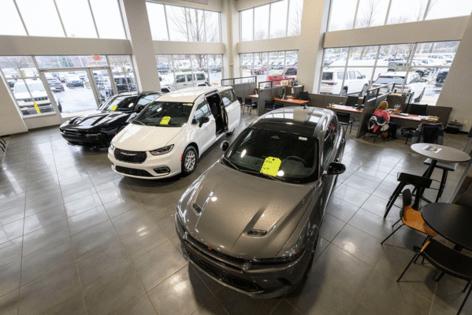Average car prices are flat since tariffs took effect. How'd that happen?
Published in Business News
When President Donald Trump's 25% auto tariffs took effect in early April, industry watchers figured vehicle prices would steadily rise as carmakers peeled back discounts and increased MSRPs.
Three months later, that hasn't quite turned out to be the case.
Prices on many models have crept up. But the average marketed price industrywide is flat, at about $49,700, according to Cloud Theory, which tracks car inventory on dealer websites across the country.
"We were expecting that number to climb pretty quickly, and it didn't, and we were surprised by that, honestly," said Rick Wainschel, Cloud Theory's vice president of data and analytics.
When Wainschel crunched the numbers, though, "it started to make sense." Prices on about 70% of individual models did rise in recent weeks. Yet automakers simultaneously pushed a larger share of their most affordable models and trims into the market, he said, which has helped hold average overall prices down.
Wainschel said there appears to be collective automaker action "to combat the higher prices by offering affordable alternatives for consumers to buy."
Regardless, the eye-watering price hikes that analysts projected might range from a few thousand bucks to $15,000 haven't materialized. But experts say as Trump's existing tariffs linger — including the 25% on vehicle imports, and additional levies on parts, steel and aluminum — car sticker prices will soon be noticeably higher as manufacturers pass along some of their added import costs.
"We're in the early stages of seeing how manufacturers deal with these added costs, but we do not believe that the American consumer can absorb it all," said Jonathan Smoke, chief economist for Cox Automotive Inc., a dealer digital services provider, in a recent presentation.
He noted that consumers are more price-sensitive now than they were a few years ago during the pandemic. Cox anticipates the average new vehicle price will eventually rise by 4% to 8%.
"By the end of the year, there'll be meaningful increases, particularly on the imported vehicles, less so on domestic," said Mark Wakefield, global auto market lead for consultant AlixPartners.
The firm anticipates that manufacturers will ultimately pass along 80% of the cost of the tariffs to consumers, pushing prices up by about $2,000 per car.
Automakers have taken varying approaches to dealing with the tariffs. Ford Motor Co. and Stellantis NV, both grappling with heavy inventory levels, saw a sales opportunity amid the threat of tariff price hikes and offered employee pricing for all. Other manufacturers pulled back on some of their discount programs. A few companies have recently announced relatively small MSRP increases, including Toyota Motor Corp., Subaru Corp., and Mitsubishi Motors Corp., though not all are acknowledging they are tied to higher import duties.
And some companies appeared to be taking a couple of approaches at once. Even as Ford maintained its employee pricing program, for example, it told dealers last month it was upping prices due to tariffs on its Mexico-built vehicles by as much as $2,000. And it began tweaking MSRPs elsewhere, too: A Detroit News analysis found increases of at least hundreds of dollars on 10 nameplates between May 28 and July 2.
Wainschel said he'll be watching closely to see what happens when Ford ends its employee pricing program in a few days. If the automaker substantially raises its pricing after that, he said, it could create a "domino effect" and give license to other brands to do the same.
Ivan Drury, director of insights at vehicle information site Edmunds.com Inc., said he anticipates automakers will integrate tariff price increases into their 2026 models, which will start hitting dealerships later this summer and fall. It's easier to explain a price change on a new model-year vehicle, he said, which in many cases offers a few new features and freshened sheet metal.
Drury said the "knee-jerk reaction" was that tariffs would drive up car prices right away, but it makes sense that the changes have been slow. Many carmakers were already sitting on bloated pre-tariff inventories when the new import taxes kicked in, he said, creating a "lag time" before price increases were necessary.
"Dealers aren't feeling the pinch, either, because they still have units," said Joseph Yoon, an Edmunds consumer insights analyst. "We saw during the pandemic what happens when dealers don't have units: prices jump overnight."
Rhett Ricart, a Columbus, Ohio-area dealer who sells Ford, Chevrolet and Hyundai vehicles along with several other brands, said manufacturers are trying to bring down their tariff costs by sourcing more parts from the United States. But that process will take months, and for now, many are simply eating the extra costs.
He said carmakers will start increasing their sticker prices — but it will happen slowly, and quietly. No one wants to announce a big price hike that could give a competitor a chance to capitalize.
"They're going to boil this frog," Ricart said, "and turn the heat up real slow on it."
©2025 www.detroitnews.com. Visit at detroitnews.com. Distributed by Tribune Content Agency, LLC.












Comments